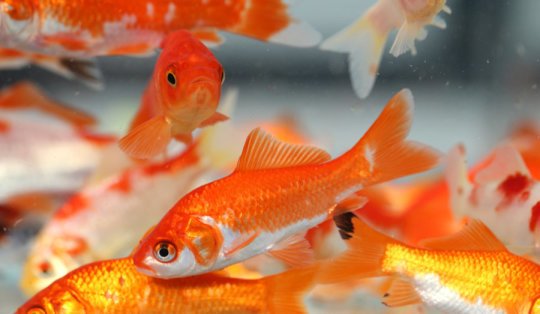Alcohol Helps Goldfish Survive Winter Without Oxygen
When fishes begin to turn their own body fluids into alcohol just to survive, then you should know that the times are hard….lolz
As it turns out, winter has hit virtually every part of the polar and temperate regions of our planet. Most people and animals in such regions are certainly used to the harsh winter conditions that it is somewhat easy for them to deal with it and adapt.
But for our little aquatic friends, it can be difficult dealing with the ice which covers ponds, river surfaces and prevents oxygen from reaching the aquatic life underneath, during winter.
And courtesy of a recent discovery, some fishes tend to deal with cold and chilly winters like we humans do – with alcohol.

Fishes and Alcohol
According to a new study by Scientists at the Universities of Oslo and Liverpool, 'goldfishes' and 'crucian carps' have been found to convert lactic acid into alcohol in order to survive the freezing and harsh winter conditions.
In a recent publication by Scientific Reports, it was discovered that the fishes developed this remarkable ability as a result of the ice which covers water surfaces during winter and blocks oxygen from getting to the aquatic life beneath.
Fishes also require oxygen for survival and an absence of it, due to ice in winter becomes a big issue for them. As it turns out, a lack of oxygen in the water causes lactic acid to build up, and this can kill the fishes within minutes.
However, with this cool molecular mechanism they possess, the fishes can actually turn the lactic acid into alcohol, and then release it through their gills.
According to the study, the longer the fishes stay trapped underneath the ice, the higher their blood levels rise.
A scientist, Dr. Michael Berenbrink, who was part of the study and an author of the study, explained that;
“If you measure them in the field the blood alcohol goes up above 50mg per 100 millilitres, which is the drink-drive limit in Scotland and northern European countries.” So they are really ‘under the influence’.”

The ‘Boozy’ Nature of Fishes
Now while we might be wondering how fishes behave when they are literarily “under the influence”, it is important to note that the drunkenness exhibited by the carp family of fishes means that they are the only fish species capable of adapting to their environment by using their ability.
Dr. Cathrine Elisabeth Fagernes, the lead author of the report also said;
“The ethanol production allows the crucian carp to be the only fish species surviving and exploiting these harsh environments, thereby avoiding competition and escaping predation by other fish species with which they normally interact in better oxygenated waters.”
“It’s no wonder then that the crucian carp’s cousin, the goldfish, is arguably one of the most resilient pets under human care.”
Similar fish and alcohol related studies in 2014 also revealed that the Goldfish aren’t the only species of underwater creatures that benefit from being boozy.
The 2014 study showed that when put in an alcoholic solution, ‘zebrafish’ were more confident leaders. They were found to swim faster and displaying less fear or hesitation. However, when some set of fishes were exposed to ethanol solutions with higher alcohol levels, they were found to be slow and groggy.
Potential alcoholic conversion rate
Despite the newly-discovered fish talent, the report revealed that the rate of conversion of water to an alcoholic drink by the fish’s molecular mechanism is a bit low statistically.
Dr. Michael Berenbrink said;
“If you put them in a beer glass and closed them off, it would take 200 days to get it up to 4% alcoholic level.”
In Summary
Although this study which correlates fish and alcohol, can teach us as humans, a great deal on evolutionary adaptations, it must be pointed out however, that the recently discovered fish ability won’t exactly turn any water into wine.
The study suggests that if you own a pet goldfish and you indeed desire to generate a cocktail out your little darling; it would take about a year for it to work its magic but it would still generate a pretty weak alcoholic drink, suggesting that fish’s water-to-alcohol conversion rate isn’t exactly standardized on just any water.
Research: Paper
Further Reading: 1, 2, 3, 4, 5
Thank you for your time and for reading my post.
If you found this post interesting, then kindly UPVOTE, RESTEEM and FOLLOW @rickie, for more quality posts.

Followed... Very interesting this. Humans also produce small amounts of natural alcohol within the body not a detectable level the quantity been that low. It's dependant on the metabolism as far as i'm aware, which is why it's produced more in winter due to lower metabolic rate.
Yes @splutterycarp. You are very right about that. The cold causes drop in the body's metabolic rate which triggers the reactions. Thanks for reading.
So you're saying if I pour a quart of Jack in my pond, it will prevent winterkill?
In all seriousness, good article.
Lolz....@pinesresumehelp. Your fishes are going to have a jolly good fiesta if you do. Hahahhaha. But yea, the research shows that it the liquor would aid their survival, especially if your pond is exposed to freezing. Thanks for reading.
Wow nice tip.. So i have to feed alcohol to my gold fish
Lolz, it would most definitely thank you @geetasnani.
Wonders of creation, shows that there an intelligent creator who designed it.
#steemsoccer1
Who designed the fish or? I'm not sure i follow your point @theheralds. Thanks for visiting.
Well done! This post has received a 7.14 % upvote from @litasio thanks to: @steemstem-bot. Whoop!
If you would like to delegate to the @LitasIO you can do so by clicking on the following link: 10SP